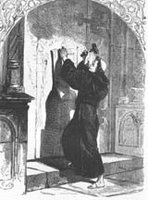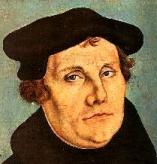Doin' right ain't got no end.
 I'm not a fan of Halloween, not only because it is a day with pagan roots and unholy imagery, etc., but also because it has eclipsed what is one of the most important days in the development of Western Civilization in general and Protestantism in particular.
I'm not a fan of Halloween, not only because it is a day with pagan roots and unholy imagery, etc., but also because it has eclipsed what is one of the most important days in the development of Western Civilization in general and Protestantism in particular.In 1517 on October 31 Martin Luther sparked conversation regarding the state of the church and what he saw as errors, heresies, and abuses. Luther posted his 95 Theses on the door of the Castle Church in Wittenberg, Germany.
In his preamble he said:
Out of love for the truth and from desire to elucidate it, the Reverend Father Martin Luther, Master of Arts and Sacred Theology, and ordinary lecturer therein at Wittenberg, intends to defend the following statements and to dispute on them in that place. Therefore he asks that those who cannot be present and dispute with him orally shall do so in their absence by letter. In the name of our Lord Jesus Christ, Amen.Some examples of his 95 Theses are:
- They preach mere human follies who maintain that, as soon as the coin rattles in the strong box, the soul flies out of purgatory.
- The indulgence of the Pope cannot take away the smallest daily sin, as far as regards the guilt, or the offence.
- Those who believe that they can be certain of their salvation because they have indulgence letters will be eternally damned, together with their teachers.
- If it is true that the pope is able to free souls from purgatory, he ought to use that power, not for trivial reasons such as the building of a church, but simply out of love, and freely.
- Why does not the pope, whose wealth is today greater than the wealth of the richest of the rich, build this basilica of St. Peter with his own money rather than with the money of poor believers?
Indulgences were the puchase of forgiveness of sin for oneself or for the earlier release of another from Purgatory. Most people were not able to read the Bible (only available in Latin) and were in fact discouraged from doing so since they were not trained as priests. As such, many were at the mercy of those such as Johann Tetzel who was more of an extortionist than anything else.
Many declare October 31 as "Reformation Day" due to a recognition that Luther's posting marks the beginning of the Reformation.
So, what was the Reformation? In short, the Reformation was the great rediscovery of the Gospel, the good news of salvation by grace alone through faith alone because of Christ alone. The establish church had lost sight and consequently kept the common people ignorant of the truths of the Bible. During these Dark Ages people became syncretistic and more observant of superstitions than anything resembling Christianity.
Like many, we’re celebrating the monumental October 31st in 1517 when a relatively obscure monk sought academic dialogue. He wanted to start discussion regarding concerns he had with the church and posted, in Latin, his concerns. Little did he realize that this one act would spark so much as greater discussions regarding reform arose (i.e., the Protestant Reformation).
 As we celebrate our ancestry I pause to think of this unique fellow. The first time I was in Wittenberg I was standing in front of the church door contemplating the small town in what was formerly East Germany, as I ate my 3rd and 4th fifty-cent bratwurst. What was it about this man and his passion that would start here and travel so far?
As we celebrate our ancestry I pause to think of this unique fellow. The first time I was in Wittenberg I was standing in front of the church door contemplating the small town in what was formerly East Germany, as I ate my 3rd and 4th fifty-cent bratwurst. What was it about this man and his passion that would start here and travel so far?Luther was fully aware of his need for forgiveness, passionately so. He saw God's demands for perfect righteousness in Scripture and knew it was never attainable, but only given as a gift to those who believe.
Even after conversion, Luther realized the need for God's grace and our depravity. He embraced the Latin phrase simul iustus et peccator, "simultaneously justified and sinner." He even referred to himself as a "stinking bag of maggots."
 Today people would tell Luther to work on his self-esteem, to go to a church where the primary task is helping people feel good about themselves. Yet, Luther knew, as we should know, that Christianity is not about feeling good about ourselves, but about having a right relationship with God through Jesus Christ by faith in Him alone.
Today people would tell Luther to work on his self-esteem, to go to a church where the primary task is helping people feel good about themselves. Yet, Luther knew, as we should know, that Christianity is not about feeling good about ourselves, but about having a right relationship with God through Jesus Christ by faith in Him alone.Christians shouldn’t go to church to feel good about themselves, but to feel good about Christ and what He’s done. Christ is holy; we are unholy. He doesn’t need us; we need Him.
Luther’s self-awareness is refreshing and mirrors that of the Apostle Paul, whose self-perception diminished as he progressed in holiness. He went from being the “least of the apostles” (1 Cor 15:9) to “less than the least of all God’s people” (Eph 3:8) to the “chief”of sinners (1 Tim 1:15).
Don’t misunderstand. It’s not that Paul got worse the longer he was a Christian, quite the opposite. However, his understanding of God’s holiness became clearer. The more mature he got the more he realized that the gap between his holiness and God’s was larger than he had ever imagined.
God’s grace is amazing in that it not only forgives, but also transforms the lives of the forgiven. But, that progress is not basis for a right relationship with God, which is graciously based on faith alone in Christ alone.
Intrinsically, one must recognize his or her sin before ever embracing a Savior from the penalty of sin. Luther and Paul did and knew that even after believing in the risen Lord Jesus Christ God dealt with them graciously. God is not obligated to show grace and mercy, by definition, but He lovingly shepherds His children. Hopefully, this Reformation Day you can realize God’s grace and unashamedly proclaim, Simul iustus et peccator.

There had been others before Luther (e.g., Huss and Wycliffe) and others followed in a desire for Reform. Yet, we dare not think the work is finished, nor will it be prior to Christ's return for His bride, the Church. A Reformed church has not arrived, but realizes it is semper reformanda, "always reforming." In fact, ecclesia reformata semper reformanda est ("the Reformed church is always reforming").
What are you going to do to celebrate Reformation Day?
What are you going to do to carry the baton as you too seek church reform that God may be better glorified by His church on this planet?
If you're looking for an idea, check out Steve Camp's suggestion.
However, let October 31st 2006 spark your personal reformation as the church is consequently reformed via its individual parts.
Semper Reformanda ... always reforming, because doin' right ain't got no end.



4 Comments:
Luther was the bizzomb! He was like, "What, you want some of dis?!" And they were like, "Naa, you ahight gee! Go on with yo bad self!"
Your sketch of the Reformation reads like Fox's Book of Martyrs.
Jay,
Then Calvin came along and said, "Word up, L-Money. That sola Fide is off da hook!"
Thanks, Charlie.
Though not actually put to death, he certainly was close to being martyred for the faith and I'm sure he would have endured admirably, if providence so required it.
Post a Comment
<< Home